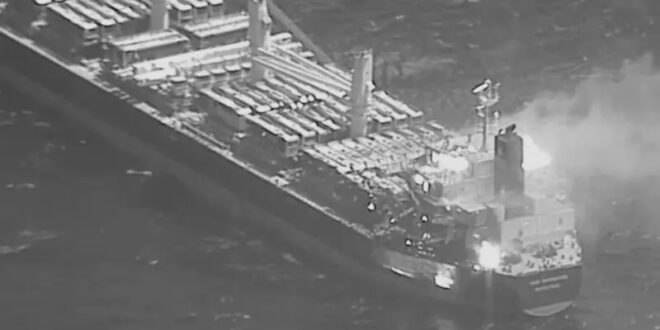Despite the US and its allies attempting to provide safe passage in the Red Sea, the international waterway simply is not safe. In fact, it’s quite deadly – as the crew of the Barbados-flagged True Confidence unfortunately discovered Wednesday, March 6. The merchant vessel was set ablaze by a terrorist attack by Iran-backed Houthis in Yemen, and three sailors were killed.
The highly touted Operation Prosperity Guardian (OPG) is a US-sponsored effort to coordinate a multinational force to protect international merchant vessels transiting the Red Sea and the Bab al-Mandab strait. Yet Iran-backed Houthis in Yemen continue to attack innocent commercial shipping in the region. Evidence shows that these attacks are part of an Iranian strategy to build influence in the Gulf Region.
US Operations Ineffective Against the Houthis
OPG, in combination with occasional air attacks on Houthis in Yemen, is supposed to be effective in stopping the attacks on Red Sea shipping. Clearly, these military efforts are not effective. The Houthis continue to fly drones, fire ballistic missiles, and launch cruise missiles at non-combatant cargo and tanker vessels. Most recently, to absolutely no one’s surprise, the Iran-supplied Houthis have killed three innocent seamen. As US Central Command described the March 6 deadly attack:
“At approximately 11:30 a.m. (Sanaa time) Mar. 6, an anti-ship ballistic missile was launched from Iranian-backed Houthi terrorist-controlled areas of Yemen toward M/V True Confidence, a Barbados-flagged, Liberian-owned bulk carrier, while transiting the Gulf of Aden. The missile struck the vessel, and the multinational crew reports three fatalities, at least four injuries, of which three are in critical condition, and significant damage to the ship.”
This attack comes after numerous US and United Kingdom missile and fighter bomber attacks throughout Yemen against anti-ship ballistic missile sites, cruise missile in preparation for launching, and drone launchpads. American naval forces have attacked Houthis’ headquarters and weapons warehouses to no apparent impact on the Iran-supported Houthis and their capability to continue the attacks on Red Sea shipping. According to a Reuters report, “’The targeting operation came after the ship’s crew rejected warning messages from the Yemeni naval forces,’ the militia’s military spokesman Yahya Sarea said in a televised speech.”
The speech by the Houthi spokesman raises an interesting question: How is it that the Houthis still have any “naval” forces afloat? How do the Houthis have any sea-going vessels or dock facilities that US air attacks have not destroyed? If the US air attacks are going to be persuasive, they should destroy completely the Iran-backed Houthis’ capacity to wage hostilities. That would be a good strategy. But that raises an even more fundamental question: What is the Biden administration’s strategy in dealing with the Iran proxy? Unfortunately, it is becoming clear that Iran has a strategy that’s not nearly as opaque as our own.
“Iranian military and security leaders are increasingly discussing the need to expand the Iranian military presence around the Red Sea and the Mediterranean Sea,” the Institute for the Study of War (ISW) explained in its Iran Update, March 7, 2024. The Islamic Revolutionary Guard Corps Navy and Aerospace Force have been charged with expanding Iran’s strategic radius of action focus out to “5,000 kilometers,” including the Strait of Gibraltar.
Iran Has a Strategy for the Middle East; Biden Doesn’t
An Iranian senior military advisor to Iran’s supreme leader, Major General Yahya Rahim Safavi, portrayed “the Mediterranean Sea as part of Iran’s ‘strategic depth.’” The ISW reported, “Iran would probably use an expanding military presence around the Red Sea and the Mediterranean Sea to threaten commercial traffic, as Iran has long done so around the Persian Gulf and is currently supporting Houthi attacks on global commerce.” Through its proxies, Iran appears to be executing its strategic planning. The Houthis, mainly, are an effective instrument of Tehran’s long-range objectives. And the US is doing little to disrupt those plans.
Unless stopped, Iran will continue to advance its goals in the Middle East, including the Eastern Mediterranean Sea, the Persian Gulf, and the Red Sea. Tehran has a plan and strategy to achieve it. Iran’s proxies, including the Houthis, will continue to project Iran’s military influence into the Gulf Region unconstrained by the US. The ruling Islamic theocracy in Tehran already perceives the Biden administration as weak-willed. How could it not? Iran’s proxies have done the mullahs’ dirty work for them, leaving Iran unscathed. Iran-backed militias killed three American service members at the end of January, and now two Filipino seamen and one Vietnamese merchantman have lost their lives at the hands of Iran. As the US does nothing, Iran will grow bolder. What good can come of that?
 Eurasia Press & News
Eurasia Press & News

